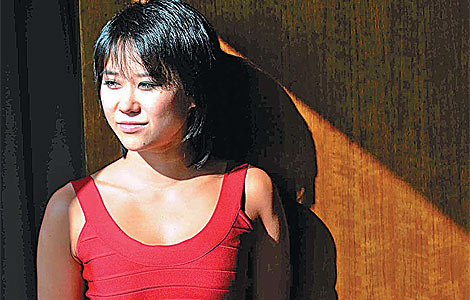|
 |
On the day she attended the press conference at the National Center for the Performing Arts more than three years ago, pianist Wang Yuja was not wearing any make-up.
Her mother had just taken her to buy a "formal suit" in Xidan, the nearest shopping area to the NCPA. It was a local brand, a simple white shirt and cream pants. They were in such a hurry, or maybe the sales girl was too careless, that Wang wore the security tag to the press conference.
The June 2009 recital was her first since she left to study abroad in 1999. She has returned every year since with concerts or a new album. Last week, she brought both concerts and a recording.
When she saw the press this time on the morning after her NCPA concert, she was nicely dressed and smoky-eyed. The previous night, in a sexy purple one-strap dress, she played in a sold-out concert with Michael Tilson Thomas and the San Francisco Symphony Orchestra.
Asked how she feels returning to the same hall every year, she giggles and blurts out, "I'm getting old."
Who would think 25 is "old" as a rising pianist? But even at 22 in 2009, she said: "I'm not young. I was young when Earl Blackburn (manager to such artists as pianist Lang Lang, violinist Vadim Repin and conductor John Nelson) signed me at 16."
"When I gave my first recital at 7, I thought 16 would be very old and I would not play by that time. I wanted to be a scientist or engineer, a profession that ‘uses brain'."
"I cannot say how much I enjoy the career. It's like any job — you enjoy it sometimes and don't other times. But like being a dancer or athlete, there's no turning back. It requires you to be tough both physically and mentally.
"But anyway, when you feel lonely or sad, you can play the piano or even hit the keys."
Like anybody of her age, she loves social media and logs onto Facebook whenever she has time. She just watched the latest 007 movie Skyfall on the flight to China.
"Now I'm getting used to the crazy life of traveling around the world for some 120 concerts a year. I make new friends in many cities, and whenever I return they take me out."
She settled down in New York in 2009 and says the city is "a paradise for single people" because it has a "perfect delivery service".
The popular Chinese writer Eileen Chang (1920-95) once advised people "to be famous as early as possible." Obviously Wang agrees.
Born in 1987 to a musician father and a dancer mother, Wang began to learn the piano as a 6-year-old with professors at the China Central Conservatory of Music. She won several competitions in Beijing and had performed in Spain, Germany and Australia by the age of 9.
At 12, she won a scholarship and moved to Canada alone and then moved to Philadelphia to study with Gary Graffman, also the teacher of Lang Lang, at Curtis Institute of Music in 2002.
In January 2009, she signed an exclusive recording contract with Deutsche Grammophon and became the third Chinese pianist to be signed with the renowned yellow label of classical music, after Lang Lang and Li Yundi. The International Piano Magazine called 2009 "Yuja's Year".
In the last three years, her fame rose dramatically and she has worked with many renowned conductors and orchestras.
"Charles Dutiot, Claudio Abbado, Gustavo Dudamel … They are all great. It's very relaxed to work with the old maestros because they all love young soloists. You feel very safe, like in a car with an experienced driver. Playing with a young conductor like Dudamel is somehow a risk but exciting, like on a rollercoaster."
The cover of her new album Fantasia, her third with DG, features Wang wearing huge black wings on her back.
"To me, an angel with white wings is too bright. I am more like a witch, or a naughty elf. I like those tragic melodies or music with black humor," she says, adding that she likes Nietzsche and believes that the more tragic, the more hope.
At the NCPA, she played Prokofiev's Piano Concerto No 2 in G minor — a favorite because "behind it is a tragic story". The composer wrote it and premiered it himself as the solo pianist to commemorate one of his friends, who committed suicide in 1913.
The new album features 18 pieces Wang usually plays as encores. She says it reminds her of that curious box she saw at the Palace Museum in Taipei. "You open it in different way to find different treasure," she says.
Contact the writer at [email protected].